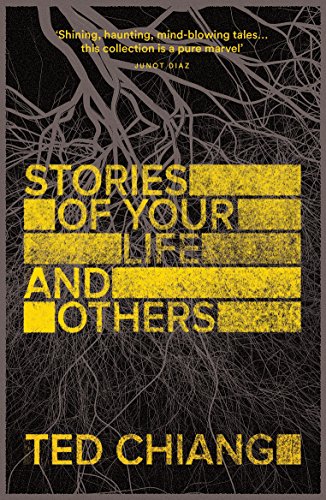 |
| Amazon link |
The full text of the story (retitled) in the collection above is just a three page read. Here's an extract from Aaron M. Wilson's review of "The Evolution of Human Science".
"One of humanity's greatest scientific achievements was the creation of the Sugimoto gene therapy. If a human embryo were to be treated before neurogenesis, the child would be born a metahuman.The demeaning role for human scientists, scrabbling at the impenetrable culture of the metahumans, is to reverse-engineer (if possible) their enigmatic artefacts, to see whether any possible benefits for humanity can be retrieved.
Metahumans are now the greatest scientists and engineers. They are have made breakthroughs that no human could ever concoct. However, there is a drawback. The metahumans have discovered that they can communicate via DNT (Digital Neural Transfer). This new language, due to its specific medium, is incomprehensible to humans. There are translations, but as with any translation from one language to another, they are far from complete.
The beauty of this story is in the way it is told. The story reads like a peer-reviewed science journal paper or article. The author of the paper questions, in light of metahuman scientists, is there a reason for human scientists. The short answer is, yes."
The metahumans are as interested in that topic as you are interested in the welfare of the worms that quietly irrigate your garden.
---
We tend to focus on one part of a problem and ignore the bigger picture. But reductionism seldom works well in human affairs.
In the mid-nineteenth century gangs of navvies built the canals and railroads. People probably speculated that we should breed a class of muscular yet docile workers for the future. Yet in the mid-twentieth century giant cranes and diggers did all the work, controlled by guys in recliners with power-assisted controls.
In the late twentieth century I recall an education which taught me many detailed facts about history, literature, science and mathematics. People probably thought that in the future, we should breed people with far better memories. But: .. Google.
In the early twenty-first century, there's rising speculation that we'll identify the thousands of alleles which have a bearing on general intelligence (IQ). Using sequence-based selection and later, genetic engineering, we'll breed a population of geniuses.
That will be neither easy nor quick. I suspect we're rather closer to AI systems which are intellectually much, much smarter than ourselves. Not so much metahumans as Google++.
It's puzzling why we're not there already. People used to think that smartness was something like enhanced powers of pure reasoning .. there was a great deal of really interesting and even exciting work on automated theorem provers (I cherish Vampire).
But what really smart people do is nothing like proving theorems by smart search from axioms and lemmas. It seems to be more about seeing the connections between a wide range of different kinds of things, and exploiting a lot of subconscious knowledge already established about each of them (knowledge, not just facts). That's a weak point in today's artificial neural net architectures but it's hardly an unknown or unaddressed problem.
A really smart system for solving problems in domains ranging from science to public administration does not require an artificial general intelligence, it is a conceivable step - perhaps a generation away.
But 25 years is still not long enough to see the first generation of genomically-enhanced metahumans.
---
Chiang had his human scientists "Catching Crumbs from the Table" of the metahumans. But most people aren't scientists. Most people's worlds haven't collapsed because no human can now beat the machines at Chess or Go.
I think we'll take the improvements to humanity on offer and be delighted that the future Google-minds will be doing the heavy-lifting of our civilisation.
Oh God, I'm falling into the Iain Banks trap!
No comments:
Post a Comment
Comments are moderated. Keep it polite and no gratuitous links to your business website - we're not a billboard here.